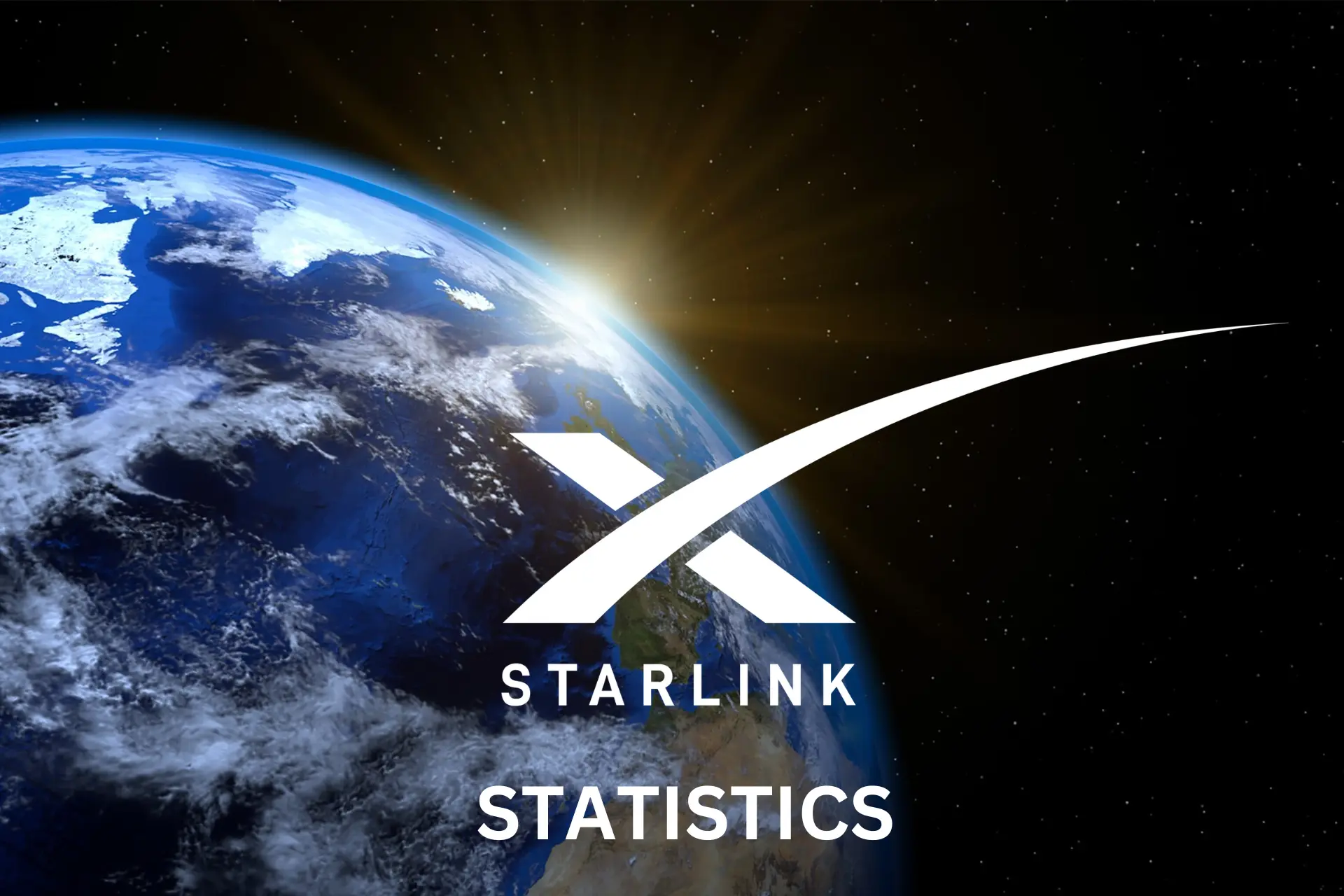20+ Starlink Statistics You Need to Know in 2025

Starlink is a revolutionary satellite ISP developed by SpaceX that offers fast internet access to remote areas.
With thousands of small, low-earth orbit satellites, it provides low-latency communication.
As of March 2023, SpaceX, its parent company has already launched over 4,000 small satellites into low Earth orbit, with plans to launch tens of thousands more.
Let’s dive into some of the most mind-blowing data and Starlink statistics.
Eye-Opening Starlink statistics
Here’s a quick overview of some Starlink facts that prove its evolution ever since its development stages.
- The first Starlink satellites were in development since 2015, and the initial prototype was completed in 2018.
- SpaceX’s Falcon 9 spacecraft launches the Starlink satellites into space, with the ability to carry up to 60 of these small satellites in one launch.
- Starlink hit 1 million users globally in December 2022.
- Currently, it offers unlimited internet speeds of 50–500 Mbps.
- Starlink’s coverage area currently includes over 53 countries, with plans to expand globally.
- The cost of Starlink’s monthly subscription is between $110 and $500 a month.
General Starlink stats and facts
Below, you’ll discover more about the Starlink satellite internet service and its revolutionary technology.
1. Starlink launched 900+ satellites in 2020
[Source: Tesla Rati, CNBC]
May 2019 marked the first launch of 60 Starlink satellites into orbit, followed by beta testing of its internet service in 2020.
The company continued to expand the constellation, with over 900 satellites deployed by the end of 2020.
Furthermore, in February 2021, pre-orders of Starlink services were made available to the public, which led to 500,000 orders by June 2021.
2. Over 7,800 satellites have been launched until April 2023
[Source: Space Flight Now]
According to the latest Starlink satellite statistics, as of March 2023, SpaceX has launched over 4,000 Starlink satellites into orbit, on top of the 3,800+ currently in orbit.
The company has the approval to launch more than 12,000 satellites to provide high-speed internet and even aims to add 30,000 more.
Statistics on demographics of Starlink’s online audience and workforce
Here are the latest statistics on the age and gender demographics of Starlink’s online audience, as well as the age distribution of its workforce.
3. Starlink.com attracts a majority male audience aged 25-34
[Source: Similar Web]
73.86% of Starlink.com’s audience is male, while the remaining 26.38% are female and the largest age group of visitors is between 25-34 years old.
4. Only 20% of Starlink users are outside North America.
[Source: Restofworld]
According to Cloudflare and self-reported statistics on Reddit, nearly 80% of Starlink users are located in North America.
While another 18% are located in Australia, New Zealand, and Europe, while just 2% live outside of the West.
5. 50% of Starlink’s workforce comprises young adults aged 20-30
[Source: Zippia]
Most of Starlink’s workforce falls within the age range of 20-30 years, accounting for 50% of employees. 30-40 years and 40+-year-olds are equally distributed, each 25%, and there are no employees under the age of 18.
Starlink’s usage and download statistics in 2023
Starlink has seen a remarkable increase in its global user base. Recent usage and download statistics reveal the company’s continued growth.
Here are the latest figures.
6. Starlink hit over 1 million users globally in December 2022
[Source: SpaceX]
Starlink usage stats show that SpaceX’s service achieved an impressive milestone, with over one million active subscribers worldwide.
So, in only 2 years, the satellite-based internet service rapidly expanded its user base and doesn’t show any sign of stopping.
7. Starlink’s app has reached nearly 2,000,000 downloads globally in 2022.
[Source: 42matters]
The majority of these downloads occurred between February 19th and April 9th, coinciding with the outbreak of war in Ukraine.
However, downloads remained high even after the initial outburst.
Before February 2022, Starlink averaged between 1,000 and 2,000 daily downloads, but currently, it’s averaging between 3,000 and 5,000 downloads per day, highlighting a significant increase in usage.
8. Starlink’s app monthly active users (MAUs) increased by 80% in 2022
[Source: 42matters]
Starlink’s Android version had around 19,600 Monthly Active Users (MAUs) at the beginning of 2022.
In March, following the launch of Starlink in Ukraine, the MAUs surged to 43,362.
Furthermore, as of August 2022, Starlink had 35,480 MAUs, an 80% increase from January.
This growth trend demonstrates the increasing demand for Starlink’s internet services globally.
9. Starlink’s coverage area currently includes over 50 countries, with plans to expand globally
[Source: Starlink Insider]
As of April 2023, Starlink’s satellite internet service is available in more than 50 countries worldwide, including the US, UK, Germany, France, Spain, and Brazil.
The company has also expanded its service to Africa, specifically Nigeria and Rwanda.
10. Starlink app ranks in the top 12 charts on Google Play and the top 9 charts on the Apple AppStore
[Source: 42matters]
Starlink achieved significant success in both the Google Play and Apple AppStore top charts.
Specifically, the Android version of the app ranks in the category-specific top charts in 12 countries, including Australia, Canada, Chile, China, and the United States.
At the same time, the iOS version also ranks in the category-specific top charts in 9 countries, including Canada, Chile, Mexico, and the United States.
Starlink’s popularity is particularly noteworthy in Canada, New Zealand, and Ukraine, where the app has generated a significant number of downloads in 2022.
As of May 2022, Starlink has been downloaded 116,633 times in Canada, 15,203 times in New Zealand, and 564,548 times in Ukraine.
Starlink subscription and investment statistics
Starlink has been making headlines with its satellite internet service and ambitious growth plans.
Here are some key figures on Starlink’s pricing and investment.
11. The monthly subscription to Starlink ranges from $110 to $500
[Source: Forbes]
According to Forbes, Starlink offers unlimited monthly data for as little as $110.
Meanwhile, the highest price for the Starlink Business plan costs $500 monthly, with a one-time equipment fee of $2,500.
12. Musk says total investments in Starlink to reach $20-$30 billion
[Source: Reuters]
On June 29, 2021, Elon Musk revealed during the Mobile World Congress in Barcelona that the lifetime investments in Starlink may amount to $20-$30 billion.
Musk also stated that between $5 billion and $10 billion would be invested in Starlink before the satellite internet venture achieves positive cash flow.
Comparison of Starlink internet speed and pricing with competitors
Here’s how Starlink compares to traditional internet providers and its competition in the satellite internet market.
Starlink’s performance, outages, failures, and losses
Despite Starlink’s impressive performance, the service has also experienced setbacks and challenges in providing high-speed internet to its growing users.
Here are some of the most interesting facts.
13. Starlink’s speed dominates traditional providers with up to 500Mbps
[Source: Tech Crunch]
Starlink statistical data shows that it outperforms traditional internet providers regarding speed and latency. It offers an average speed range of 50 to 200 Mbps.
While Starlink Business offers faster and more consistent speeds ranging between 150 to 500 Mbps, but at a higher cost than regular Starlink internet.
In contrast, traditional internet providers offer speeds ranging from 10 Mbps to 1 Gbps, depending on the package and region.
14. In 2020, Starlink’s failure rate was less than 2.5% for its satellites
[Source: Business Insider]
According to Jonathan McDowell, an astronomer at the Harvard-Smithsonian Center for Astrophysics, around 2.5% of the Starlink satellites may have failed.
What does that mean? Basically, a failed satellite can’t be maneuvered in orbit and is unresponsive.
15. Starlink service outage affected thousands of users in November 2022
[Source: Space Explored]
In February 2021, Starlink experienced an outage that lasted for about 15 minutes and affected thousands of users worldwide.
The outage was widely reported, with several individual experiences confirming the service disruption. However, the issue was resolved quickly, and the service was restored shortly after.
16. In February 2022, Elon Musk’s SpaceX lost 40 Starlink satellites
[Source: Fortune]
In 2022, a geomagnetic storm from the Sun caused Elon Musk’s Starlink to lose 40 out of 49 satellites, which cost SpaceX millions of dollars.
However, Starlink’s overall performance has been impressive, with thousands of satellites launched and providing high-speed internet to more than one million subscribers globally.
Impact of Starlink on internet connectivity
Starlink has been making significant strides toward improving global connectivity. Let’s is a look at Starlink’s collaborations, expansion, and impact on remote communities.
17. Starlink connects high-speed internet to 60 million rural Americans
[Source: Statista, Bloomberg]
Starlink network statistics reveal it connected approximately 60 million rural and remote Americans with high-speed internet. This revolutionizes access to online education, remote work, and more.
Currently, according to the Federal Communications Commission (FCC), 21 million Americans lack access to broadband internet.
However, Starlink aims to bridge this digital divide and bring high-speed internet to underserved areas.
18. Starlink’s role in connecting remote communities to the Internet in 2022
[Source: Starlink]
Starlink has been able to close the rural broadband gap by providing essential online services to rural communities.
Consequently, in 2022, with the use of Starlink, students across the globe could attend remote learning.
Moreover, it made virtual doctor visits possible for rural communities.
Rural communities benefiting from Starlink include Ector County Independent School District in Texas, Cherokee Nation in Oklahoma, and remote schools in Sotomó and Calete Sierra, Chile.
19. Traditional telecommunication is evolving, and Starlink has a huge contribution
[Source: Science Direct]
Businesses and individuals can access the internet from anywhere in the world, helping to bridge the digital divide.
Starlink’s service is cheaper than traditional internet services and unaffected by weather conditions.
Its high-speed and low-latency internet access is revolutionizing the industry and providing a sustainable solution for the future.
20. Starlink started collaborating with some of the industry’s giants
[Source: CNBC, SpaceX]
In May 2021, SpaceX announced agreements with Google Cloud Platform and Microsoft Azure to provide on-ground computing and networking services for Starlink.
Furthermore, SpaceX collaborated with T-Mobile in 2022 to provide customers with text coverage across several areas in the US using Starlink’s satellite network and T-Mobile’s wireless network.
These areas include the continental US, Hawaii, parts of Alaska, Puerto Rico, and territorial waters.
Additionally, they have extended an invitation to carriers worldwide to partner with them for global connectivity.
This collaboration marks a significant step towards providing more accessible and reliable internet services across the globe.
21. The internet service provider plans to launch 30,000 Gen2 satellites
[Source: SpaceNews]
SpaceX announced plans in 2019 to launch 30,000 more Starlink satellites in low Earth orbit at 328 to 580 km. However, as of April 2023, only 4,000 have been launched.
So we’ll just have to wait and see how much more this satellite network will evolve in the near future.
Wrap Up
Starlink’s dedication to bridging the rural broadband divide profoundly impacts the world. Despite its relatively expensive subscription, it offers endless possibilities with reliable and fast internet access.
Additionally, with the best VPNs for Starlink, users can enjoy a high-end experience with significant security benefits.
So, if you are looking for dependable internet connectivity, it’s time to join the Starlink bandwagon.
FAQ
Starlink satellites are equipped with one of the most advanced communications systems in the world. They are designed to reduce the latency of the internet, making it faster than traditional providers.
SpaceX’s ambitious goal is to make Starlink capable of providing lightning-fast internet download speeds of up to 10Gbps, with incredibly low latency.
Starlink statistics revealed that Musk plans to launch an additional 30,000 Starlink satellites, bringing the total number to 42,000 orbiting the Earth.
Starlink satellite statistics indicate that the second-generation satellites of the company are massive, weighing about 2,000kg with solar arrays that are 20m long.
About 200 Starlink satellites are no longer operational for various reasons, including on-orbit failures and intentional or unplanned deorbiting.
Sources:
Read our disclosure page to find out how can you help VPNCentral sustain the editorial team Read more






User forum
0 messages